#James Earl Jones Theatre
Text
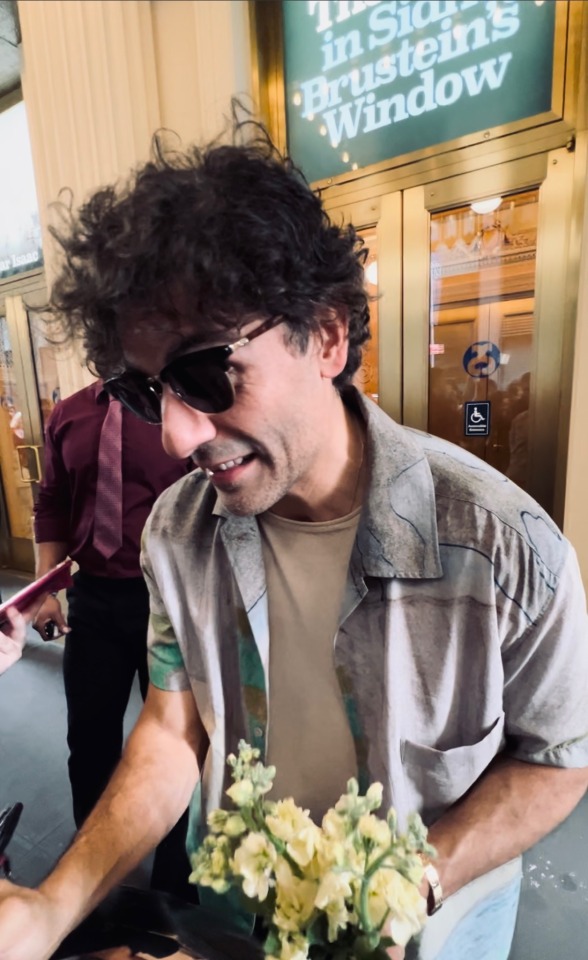

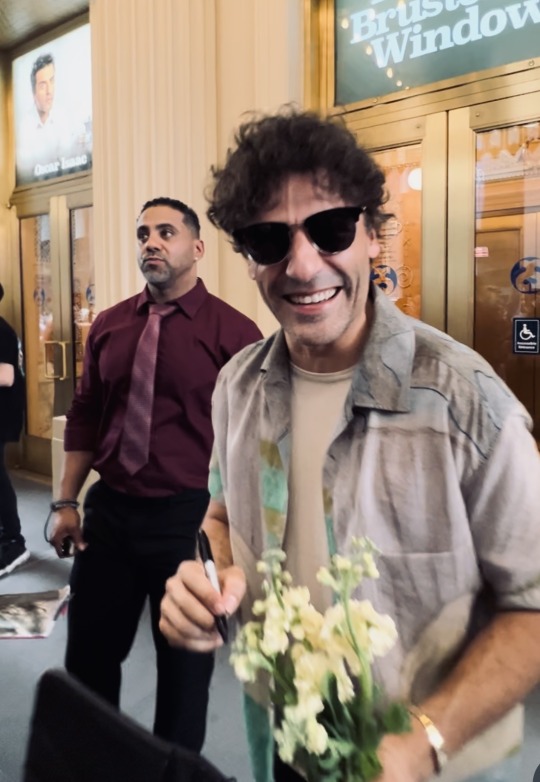

THIS IS OSCAR ISAAC listening to me, responding to me, smiling at me and then laughing.
Life checklist complete ✅ I can die happy *SCREAMS ETERNALLY*
#the absolute loveliest human#Oscar isaac#oscar isaac hernandez estrada#the sign in sidney brustein's window#sidney brustein#oscar isaac characters#Oscar isaac broadway#Oscar isaac theatre#James earl jones theatre#moon knight#in nyc to see oscar#marc spector#steven grant#jake lockley#Poe dameron#mine
2K notes
·
View notes
Text
Curtain Call from Gutenberg 12/29 matinee!!!
#andrew rannells#andy randy#josh gad#musical theatre#broadway#broadway musicals#james earl jones#james earl jones theatre#gutenberg#johannes gutenberg#gutenberg the musical
11 notes
·
View notes
Text
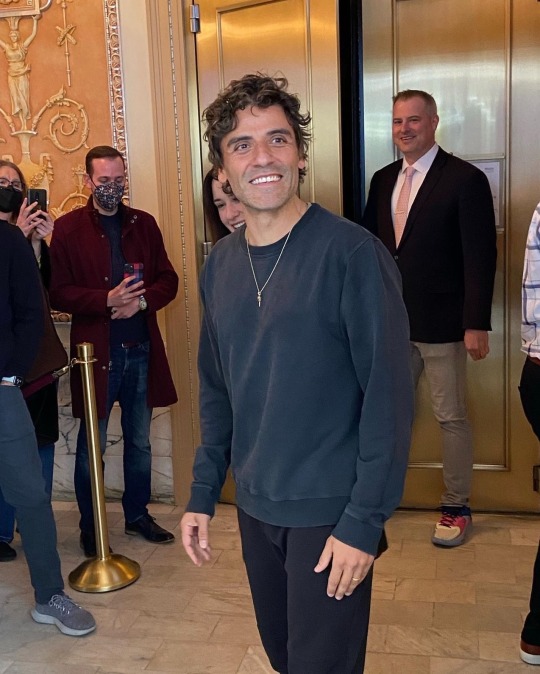
“Oscar Isaac and Rachel Brosnahan greeted ticket buyers this morning for the acclaimed revival of Lorraine Hansbury's The Sign in Sidney Brustein's Window which has moved to Broadway after a sold-out BAM engagement. The two actors are terrific in this spirited proiect directed b Anne Kaufman. Oscar was pleased to hear I had bought a ticket, priced at only $40 for the front orchestra during the first two weeks. @thesignonbway @rachelbrosnahan #oscarisaac @annekauffmanfromphoenixaz @bam_brooklyn”
Via ylodavey on Instagram
#oscar isaac#the sign in sidney brustein's window#james earl jones theatre#broadway#new york#new york city#nyc
19 notes
·
View notes
Text
'Gutenberg! The Musical!' Featherbrained, Loopy, Josh Gad and Andrew Rannells Shine!
(L to R): Andrew Rannells and Josh Gad in Gutenberg! The Musical! (Matt Murphy)
If you are looking for laughs and ridiculous fun, Gutenberg! The Musical! is the show for you. Thanks to the superbly wacky performances in this farce where Josh Gad and Andrew Rannells make a twosome of bat-sh*t silliness, Gutenberg! is a standout. Currently running at the James Earl Jones Theatre with one…
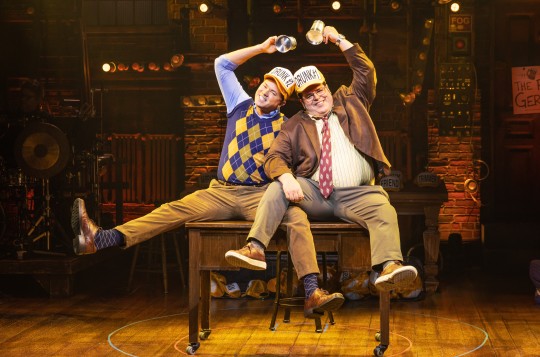
View On WordPress
#Alex Timbers#Andrew Rannells#Gutenberg! The Musical!#James Earl Jones Theatre#Josh Gad#Scott Brown & Anthony King
2 notes
·
View notes
Text

James Earl Jones in the 1982 Broadway production of “Othello.” Frank Rich wrote that “Mr. Jones’s ease and authority as a military commander seem his by birthright, even as he maintains the uneasy aloofness of an outsider.”Credit...Martha Swope/The New York Public Library
56 notes
·
View notes
Text

James Earl Jones as Othello and Christopher Plummer as Iago
Othello
56 notes
·
View notes
Text
youtube
James Earl Jones as King Lear!!!!! The full production!!
#was absolutely elated to come across this#really wish that the production with Denzel Washington a few years back came to fruition#because then they would have both played Troy Maxson and King Lear#side note you all should read Fences if you haven't#and then watch clips of both James Earl Jones and Denzel Washington#specifically act 1 scene 3#(better known as “I ain't got to like you” / “how come you ain't never liked me” )#I think it shows a really great contrast between film acting and stage acting#also!! there are clips of Denzel Washington's performance on stage and on screen#which is a delight as well.#anyway!! king lear!!#shakespeare#theatre#Youtube
15 notes
·
View notes
Text
Truly a gem from stage to big screen.


We’ll miss you. Thank you for everything.
6 notes
·
View notes
Text
Faerie Tale Theatre Reviews: Aladdin and His Wonderful Lamp

View On WordPress
#1001 Arabian Nights#80&039;s fantasy#Aladdin#Arabian Nights#David Newman#Faerie Tale Theatre#faerie tale theatre reviews#fairy tale#fairy tale adaptation#fairy tale history#fairy tale origin#fairy tale origins#fairytale#genie#genie of the lamp#James Earl Jones#lamp#leonard nimoy#magic lamp#review#ring genie#shelley duvall#sultan#television review#The 1001 Nights#tim burton#tv review#vizier
11 notes
·
View notes
Text

Portrait of actor James Earl Jones in a scene from Shakespeare's "The merchant of Venice." Stamped on back: "Friedman-Abeles Photographers, Inc., 351 West 54th Street, New York 19, N.Y." Label on back: "From: Merle Debuskey & Seymour Krawitz, 137 W. 48 St., CI 7-7507. James Earl Jones in a scene from "The merchant of Venice,' which opens the seventh season of the New York Shakespeare Festival in Central Park on Tuesday evening, June 19th, at 8:30 p.m. The production, directed by Joseph Papp, will inaugurate the new Shakespeare Festival Theatre in the Belvedere Tower area (entrance at 81st St. and Central Park West). Ming Cho Lee designed the sets and Theoni Aldredge the costume; music is by David Amram."
E. Azalia Hackley Collection of African Americans in the Performing Arts, Detroit Public Library
#james earl jones#actor#merchant of venice#shakespeare#theoni aldredge#the merchant of venice#friedman-abeles#detroit public library
295 notes
·
View notes
Text
Lovely things I witnessed Oscar Isaac doing (Saturday edition)
(And have video evidence of)
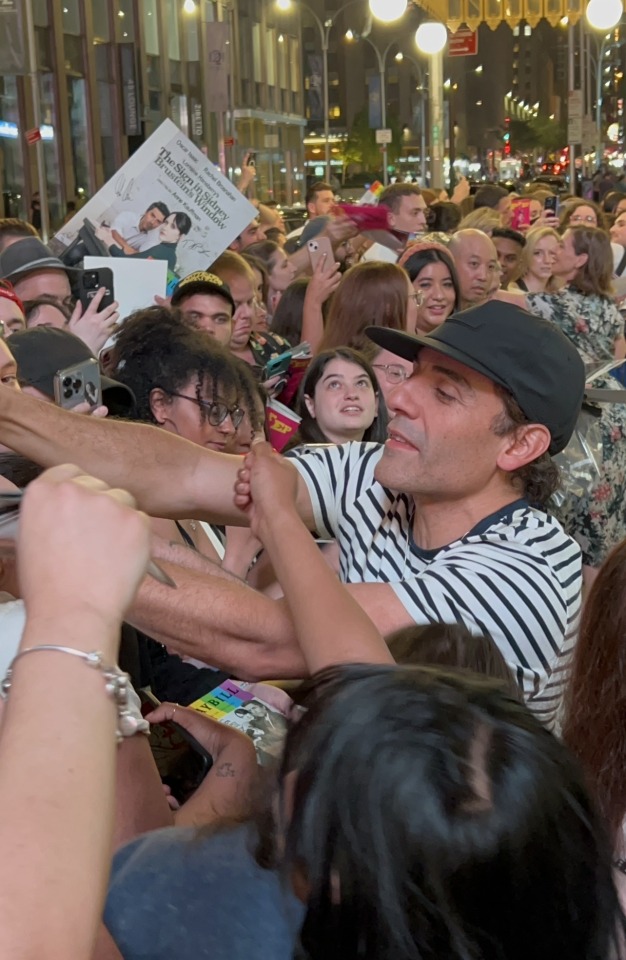
^ this is my fave pic I took Sat. It’s not even that amazing but it shows him diving right in. ACTORS DONT have to do this!
So, I witnessed Oscar:
• standing on his tiptoes to reach way deep into the fan pool to sign autos
• thanking each person for their compliments
• speaking Spanish to Spanish speaking fans
• taking extra time with a disabled fan
• stopping a lot to take pics
• being told his car had arrived, asked if he was ready to go, said no, stayed several more minutes like around 6-7 min
• being very gracious when receiving gifts
• staying the longest of any actor (I respect their off duty choices. No shade. Just love to Oscar for this)
• he doubled back to some fans he missed (see below). Here’s a reach to sign a hat:


Below he’s receiving a MK drawing




What a sweetie 🤍🖤🤍🖤🤩
•p.s. I know we see his stage door pics and go, “it’s Steven!” Or “Marc!” Or whomever.
Sat. night I got a blended Marc/Poe vibe. (Sunday was definitely Steven)
Anyone there who can comment?
Or anyone have any other thoughts to share on Stage Door Oscar ™ ??
#Oscar isaac#oscar isaac hernandez estrada#oscar isaac characters#the sign in sidney brustein's window#sidney brustein#Oscar on broadway#in nyc to see oscar#moon knight#marc spector#steven grant#jake lockley#Poe dameron#oscar isaac sighting#James earl jones theatre#stage door
453 notes
·
View notes
Text

crying just a little too hard about this news. RIP to Mr. James Earl Jones… an indisputable legend of cinema and theatre. Thank you for playing such a significant role in my childhood— your gifts, talents, charisma, and generosity are known world wide and will never be forgotten. May the road rise up to meet you, and the wind be always at your back.
173 notes
·
View notes
Text
'Ohio State Murders,' Audra McDonald's Performance is Stunning in This Exceptional Production
'Ohio State Murders' is exceptional, made so by Audra McDonald's stunning performance.
Audra McDonald, Bryce Pinkham in Ohio State Murders by Adrienne Kennedy, directed by Kenny Leon. © 2022 Richard Termine, photo credit.
For her first Broadway outing Adrienne Kennedy’s Ohio State Murders has been launched by six-time Tony award winner Audra McDonald into the heavens, and into history with a magnificent, complexly wrought and richly emotional performance. The taut, concise drama…
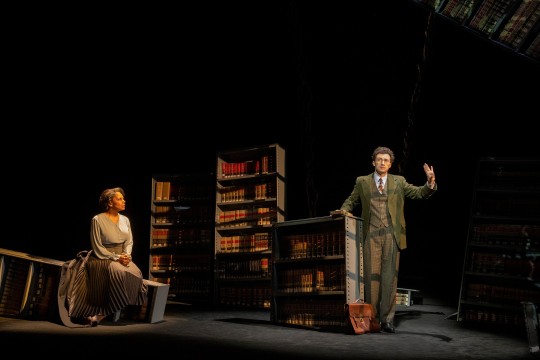
View On WordPress
#Adrienne Kennedy#Audra McDonald#Bryce Pinkham#James Earl Jones Theatre#Kenny Leon#Ohio State Murders
1 note
·
View note
Text

FATHER & SON: James Earl Jones with his Father Robert Earl Jones on Stage in the 1962 Production "Moon on a Rainbow Shawl."
Robert Earl Jones (February 3, 1910 – September 7, 2006), sometimes credited as Earl Jones, was an American actor and professional boxer. One of the first prominent Black film stars, Jones was a living link with the Harlem Renaissance of the 1920s and 1930s, having worked with Langston Hughes early in his career.
Jones was best known for his leading roles in films such as Lying Lips (1939) and later in his career for supporting roles in films such as The Sting (1973), Trading Places (1983), The Cotton Club (1984), and Witness (1985).
Jones was born in northwestern Mississippi; the specific location is unclear as some sources indicate Senatobia, while others suggest nearby Coldwater. He left school at an early age to work as a sharecropper to help his family. He later became a prizefighter. Under the name "Battling Bill Stovall", he was a sparring partner of Joe Louis.
Jones became interested in theater after he moved to Chicago, as one of the thousands leaving the South in the Great Migration. He moved on to New York by the 1930s. He worked with young people in the Works Progress Administration, the largest New Deal agency, through which he met Langston Hughes, a young poet and playwright. Hughes cast him in his 1938 play, Don't You Want to Be Free?.
Jones also entered the film business, appearing in more than twenty films. His film career started with the leading role of a detective in the 1939 race film Lying Lips, written and directed by Oscar Micheaux, and Jones made his next screen appearance in Micheaux's The Notorious Elinor Lee (1940). Jones acted mostly in crime movies and dramas after that, with such highlights as Wild River (1960) and One Potato, Two Potato (1964). In the Oscar-winning 1973 film The Sting, he played Luther Coleman, an aging grifter whose con is requited with murder leading to the eponymous "sting". In the later 20th century, Jones appeared in several other noted films: Trading Places (1983) and Witness (1985).
Toward the end of his life, Jones was noted for his stage portrayal of Creon in The Gospel at Colonus (1988), a black musical version of the Oedipus legend. He also appeared in episodes of the long-running TV shows Lou Grant and Kojak. One of his last stage roles was in a 1991 Broadway production of Mule Bone by Hughes and Zora Neale Hurston, another important writer of the Harlem Renaissance. His last film was Rain Without Thunder (1993).
Although blacklisted by the House Un-American Activities Committee in the 1950s due to involvement with leftist groups, Jones was ultimately honored with a lifetime achievement award by the U.S. National Black Theatre Festival.
Jones was married three times. As a young man, he married Ruth Connolly (died 1986) in 1929; they had a son, James Earl Jones. Jones and Connolly separated before James was born in 1931, and the couple divorced in 1933. Jones did not come to know his son until the mid-1950s. He adopted a second son, Matthew Earl Jones. Jones died on September 7, 2006, in Englewood, New Jersey, from natural causes at age 96.
THEATRE
1945 The Hasty Heart (Blossom) Hudson Theatre, Broadway
1945 Strange Fruit (Henry) McIntosh NY theater production
1948 Volpone (Commendatori) City Center
1948 Set My People Free (Ned Bennett) Hudson Theatre, Broadway
1949 Caesar and Cleopatra (Nubian Slave) National Theatre, Broadway
1952 Fancy Meeting You Again (Second Nubian) Royale Theatre, Broadway
1956 Mister Johnson (Moma) Martin Beck Theater, Broadway
1962 Infidel Caesar (Soldier) Music Box Theater, Broadway
1962 The Moon Besieged (Shields Green) Lyceum Theatre, Broadway
1962 Moon on a Rainbow Shawl (Charlie Adams) East 11th Street Theatre, New York
1968 More Stately Mansions (Cato) Broadhurst Theatre, Broadway
1975 All God's Chillun Got Wings (Street Person) Circle in the Square Theatre, Broadway
1975 Death of a Salesman (Charley)
1977 Unexpected Guests (Man) Little Theatre, Broadway
1988 The Gospel at Colonus (Creon) Lunt-Fontanne Theatre, Broadway
1991 Mule Bone (Willie Lewis) Ethel Barrymore Theatre, Broadway
FILMS
1939 Lying Lips (Detective Wenzer )
1940 The Notorious Elinor Lee (Benny Blue)
1959 Odds Against Tomorrow (Club Employee uncredited)
1960 Wild River (Sam Johnson uncredited)
1960 The Secret of the Purple Reef (Tobias)
1964 Terror in the City (Farmer)
1964 One Potato, Two Potato (William Richards)
1968 Hang 'Em High
1971 Mississippi Summer (Performer)
1973 The Sting (Luther Coleman)
1974 Cockfighter (Buford)
1977 Proof of the Man (Wilshire Hayward )
1982 Cold River (The Trapper)
1983 Trading Places (Attendant)
1983 Sleepaway Camp (Ben)
1984 The Cotton Club (Stage Door Joe)
1984 Billions for Boris (Grandaddy)
1985 Witness (Custodian)
1988 Starlight: A Musical Movie (Joe)
1990 Maniac Cop 2 (Harry)
1993 Rain Without Thunder (Old Lawyer)
TELEVISION
1964 The Defenders (Joe Dean) Episode: The Brother Killers
1976 Kojak (Judge) Episode: Where to Go if you Have Nowhere to Go?
1977 The Displaced Person (Astor) Television movie
1978 Lou Grant (Earl Humphrey) Episode: Renewal
1979 Jennifer's Journey (Reuven )Television movie
1980 Oye Ollie (Performer) Television series
1981 The Sophisticated Gents (Big Ralph Joplin) 3 episodes
1982 One Life to Live
1985 Great Performances (Creon) Episode: The Gospel at Colonus
1990 True Blue (Performer) Episode: Blue Monday
#james earl jones#black tumblr#black literature#black community#black excellence#blackexcellence365#actor#robert earl jones#stage actor
321 notes
·
View notes
Text

James Earl Jones
American actor hailed for his many classical roles whose voice became known to millions as that of Darth Vader in Star Wars
During the run of the 2011 revival of Alfred Uhry’s Driving Miss Daisy in London, with Vanessa Redgrave, the actor James Earl Jones, who has died aged 93, was presented with an honorary Oscar by Ben Kingsley, with a link from the Wyndham’s theatre to the awards ceremony in Hollywood.
Glenn Close in Los Angeles said that Jones represented the “essence of truly great acting” and Kingsley spoke of his imposing physical presence, his 1,000-kilowatt smile, his basso profundo voice and his great stillness. Jones’s voice was known to millions as that of Darth Vader in the original Star Wars film trilogy and Mufasa in the 1994 Disney animation The Lion King, as well as being the signature sound of US TV news (“This is CNN”) for many years.
His status as the leading black actor of his generation was established with the Tony award he won in 1969 for his performance as the boxer Jack Jefferson (a fictional version of Jack Johnson) in Howard Sackler’s The Great White Hope on Broadway, a role he repeated in Martin Ritt’s 1970 film, and which earned him an Oscar nomination.
On screen, Jones – as the fictional Douglass Dilman – played the first African-American president, in Joseph Sargent’s 1972 movie The Man, based on an Irving Wallace novel. His stage career was notable for encompassing great roles in the classical repertoire, such as King Lear, Othello, Hickey in Eugene O’Neill’s The Iceman Cometh and Big Daddy in Tennessee Williams’s Cat on a Hot Tin Roof.
He was born in Arkabutla, Mississippi, the son of Robert Earl Jones, a minor actor, boxer, butler and chauffeur, and his wife Ruth (nee Connolly), a teacher, and was proud of claiming African and Irish ancestry. His father left home soon after he was born, and he was raised on a farm in Jackson, Michigan, by his maternal grandparents, John and Maggie Connolly. He spoke with a stutter, a problem he dealt with at Brown’s school in Brethren, Michigan, by reading poetry aloud.
On graduating from the University of Michigan, he served as a US Army Ranger in the Korean war. He began working as an actor and stage manager at the Ramsdell theatre in Manistee, Michigan, where he played his first Othello in 1955, an indication perhaps of his early power and presence.
The family had moved from the deep south to Michigan to find work, and now Jones went to New York to join his father in the theatre and to study at the American Theatre Wing with Lee Strasberg. He made his Broadway debut at the Cort theatre in 1958 in Dory Schary’s Sunrise at Campobello, a play about Franklin D Roosevelt.
He was soon a cornerstone of Joseph Papp’s New York Shakespeare festival in Central Park, playing Caliban in The Tempest, Macduff in Macbeth and another Othello in the 1964 season. He also established a foothold in films, as Lt Lothar Zogg in Stanley Kubrick’s Dr Strangelove (1963), a cold war satire in which Peter Sellers shone with brilliance in three separate roles.
The Great White Hope came to the Alvin theatre in New York from the Arena Stage in Washington, where Jones first unleashed his shattering, shaven-headed performance – he was described as chuckling like thunder, beating his chest and rolling his eyes – in a production by Edwin Sherin that exposed racism in the fight game at the very time of Muhammad Ali’s suspension from the ring on the grounds of his refusal to sign up for military service in the Vietnam war.
Lorraine Hansberry’s Les Blancs (1970) was a response to Jean Genet’s The Blacks, in which Jones, who remained much more of an off-Broadway fixture than a Broadway star in this period, despite his eminence, played a westernised urban African man returning to his village for his father’s funeral. With Papp’s Public theatre, he featured in an all-black version of The Cherry Orchard in 1972, following with John Steinbeck’s Lennie in Of Mice and Men on Broadway and returning to Central Park as a stately King Lear in 1974.
When he played Paul Robeson on Broadway in the 1977-78 season, there was a kerfuffle over alleged misrepresentations in Robeson’s life, but Jones was supported in a letter to the newspapers signed by Edward Albee, Stephen Sondheim, Arthur Miller, Lillian Hellman and Richard Rodgers. He played his final Othello on Broadway in 1982, partnered by Christopher Plummer as Iago, and appeared in the same year in Master Harold and the Boys by Athol Fugard, a white South African playwright he often championed in New York.
In August Wilson’s Fences (1987), part of that writer’s cycle of the century “black experience” plays, he was described as an erupting volcano as a Pittsburgh garbage collector who had lost his dreams of a football career and was too old to play once the major leagues admitted black players. His character, Troy Maxson, is a classic of the modern repertoire, confined in a world of 1950s racism, and has since been played by Denzel Washington and Lenny Henry.
Jones’s film career was solid if not spectacular. Playing Sheikh Abdul, he joined a roll call of British comedy stars – Terry-Thomas, Irene Handl, Roy Kinnear, Spike Milligan and Peter Ustinov – in Marty Feldman’s The Last Remake of Beau Geste (1977), in stark contrast to his (at first uncredited) Malcolm X in Ali’s own biopic, The Greatest (1977), with a screenplay by Ring Lardner. He also appeared in Peter Masterson’s Convicts (1991), a civil war drama; Jon Amiel’s Sommersby (1993), with Richard Gere and Jodie Foster; and Darrell Roodt’s Cry, the Beloved Country (1995), scripted by Ronald Harwood, in which he played a black South African pastor in conflict with his white landowning neighbour in the 40s.
In all these performances, Jones quietly carried his nation’s history on his shoulders. On stage, this sense could irradiate a performance such as that in his partnership with Leslie Uggams in the 2005 Broadway revival at the Cort of Ernest Thompson’s elegiac On Golden Pond; he and Uggams reinvented the film performances of Henry Fonda and Katharine Hepburn as an old couple in a Maine summer house.
He brought his Broadway Big Daddy in Cat on a Hot Tin Roof to London in 2009, playing an electrifying scene with Adrian Lester as his broken sports star son, Brick, at the Novello theatre. The coarse, cancer-ridden big plantation owner was transformed into a rumbling, bear-like figure with a totally unexpected streak of benignity perhaps not entirely suited to the character. But that old voice still rolled through the stalls like a mellow mist, rich as molasses.
That benign streak paid off handsomely, though, in the London reprise of a deeply sentimental Broadway comedy (and Hollywood movie), Driving Miss Daisy, in which his partnership as a chauffeur to Redgrave (unlikely casting as a wealthy southern US Jewish widow, though she got the scantiness down to a tee) was a delightful two-step around the evolving issues of racial tension between 1948 and 1973.
So deep was this bond with Redgrave that he returned to London for a third time in 2013 to play Benedick to her Beatrice in Mark Rylance’s controversial Old Vic production of Much Ado About Nothing, the middle-aged banter of the romantically at-odds couple transformed into wistful, nostalgia for seniors.
His last appearance on Broadway was in a 2015 revival of DL Coburn’s The Gin Game, opposite Cicely Tyson. He was given a lifetime achievement Tony award in 2017, and the Cort theatre was renamed the James Earl Jones theatre in 2022.
Jones’s first marriage, to Julienne Marie (1968-72), ended in divorce. In 1982 he married Cecilia Hart with whom he had a son, Flynn. She died in 2016. He is survived by Flynn, also an actor, and a brother, Matthew.
🔔 James Earl Jones, actor, born 17 January 1931; died 9 September 2024
Daily inspiration. Discover more photos at Just for Books…?
20 notes
·
View notes
Text







James Earl Jones - US Army
by Blake Stilwell
Jones was an exceptional cadet, a member of the Pershing Rifles Drill Team and the National Society of Scabbard and Blade. The same performance ability that let him excel with the Pershing Rifles led him to the Michigan's School of Music, Theatre & Dance. He knew he wanted to be an actor, but he once referred to his fellow cadets as "the only semblance of a social life."
He initially left the university without completing his degree. With the Korean War raging at the time, he thought he would be sent overseas. But it ended in an armistice later that year, and although he returned to graduate in 1955, Jones' life took a different course.
After graduating from college, he was sent to Fort Benning, Georgia, for the Officers Basic Course and to attend Ranger School. Jones was assigned to the 38th Regimental Combat Team, where he led the setup of a cold weather training command at Camp Hale near Leadville, Colorado.
"Our regiment was established as a training unit, to train in the bitter cold weather and the rugged terrain of the Rocky Mountains," Jones told the Army in an interview. "I took to the physical challenge, so much so that I wanted to stay there, testing myself in that awesome environment, mastering the skills of survival.
"I loved the austere beauty of the mountains and the exhilaration of the weather and the altitude. I didn't mind the rigors of the work or the pioneer-like existence. I thought it was a good life."
Jones was a good officer and soon was promoted to first lieutenant. When the time came to decide whether the Army should be his career, his commanding officer asked him a poignant question: "Is there anything you feel like doing on the outside?"
His father, Robert Earl Jones, had been an actor performing in plays on stage while James was a young man. Jones told his commanding officer he had always thought about following his father's path. His commander told him he could always come back to the Army, but he should pursue his dreams.
After his discharge, Jones moved to New York City, where he studied acting at the American Theatre Wing using his GI Bill benefits while working as a janitor to support himself.
His first acting jobs came in Michigan at the Ramsdell Theatre in Manistee, where he had once worked as a carpenter and stagehand. Just two years later, he was a lead actor. By 1957, he was on Broadway. In 1964, he made his film debut as Lt. Lothar Zogg, a B-52 Stratofortress bombardier in Stanley Kubrick's "Dr. Strangelove or: How I Learned to Stop Worrying and Love the Bomb."
James Earl Jones' first leading role was in the 1970 film "The Great White Hope," a part he'd previously played on stage. His performance led to his first Academy Award nomination for Best Actor, making him the second Black man to receive the nod.
After a career spanning more than 60 years, Jones has been called "one of the greatest actors in American history" and "the best known voice in show business." He received the National Medal of the Arts from President George H.W. Bush, Kennedy Center Honors from President George W. Bush and the Screen Actors Guild Life Achievement Award. He also has achieved the "EGOT" -- winning at least one Emmy, Grammy, Oscar and Tony award.
But after a lifetime of success, he still remembered his time in the Pershing Rifles as some of the best years of his life. Jones died at his home in Dutchess County, New York on Sept. 9, 2024. He was 93 years old.
#us army#rangers#camp hale#james earl jones#korean war#38th regimental combat team#colorado#veteran#actor
19 notes
·
View notes